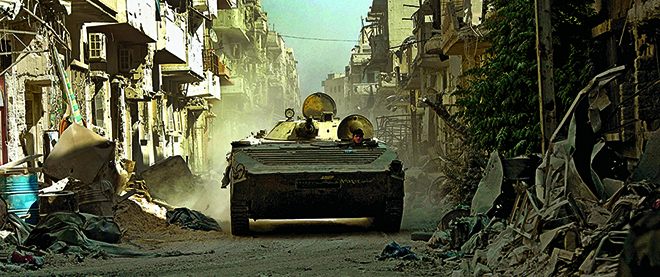Good news, bad news
Chris Hadfield on parade, more on Mike Duffy and babies on their backs
Todd Korol/Reuters
Share
Good news

The show goes on
“Hell or high water” was the rallying cry, and last week the Calgary Stampede opened on schedule with beloved spaceman Chris Hadfield leading the parade through areas that had been submerged during last month’s floods. Attendance in the early days was lower than last year, but that the “greatest outdoor show on Earth” is even happening is a triumph. And amid the cleanup, RCMP Commissioner Bob Paulson asked for a review of the decision to seize firearms in High River during the flood—a welcome step toward post-flood reconciliation.
Seeking the hard truth
The B.C. Coroner’s office announced an inquest into the death of former peacekeeper Gregory Matters this week. Mounties involved in Matters’s shooting at his property outside Prince George, B.C., last year were cleared of wrongdoing, but his family wants to know how an unarmed man was shot dead on his own property. The 40-year-old, who suffered from post-traumatic stress disorder, became “freaked out” by the sounds of a helicopter used to contain him, say officers. Last month, Matters was awarded the Memorial Cross, given to soldiers whose deaths are linked to their military service.
Second chances
Eliot Spitzer is jumping back into the political ring, running for New York comptroller in civic elections this fall. The former New York governor, known for chasing down white-collar criminals, was forced to resign amid a prostitution scandal. He paid a hefty price: His job, personal life and ambition for higher office evaporated. But Spitzer was a rare politician: thick-skinned and willing to take on the influential and well-connected. His return—this time, with his eye trained on the city’s books—would be a good thing for New York.
A breath of hot air
Climate change might not be a total loss for the planet after all. New Australian research suggests higher levels of carbon dioxide have increased the amount of foliage in arid, desert areas by 11 per cent over the past 30 years through a process called CO2 fertilization. Meanwhile, a separate study found that air pollution might have actually reduced the number of storms in the North Atlantic region.
EPAThe Syrian army launched an attack on rebel-held areas in Homs province
Bad news

Follow the money
More troubling revelations emerged in the Mike Duffy affair last week. According to a sworn RCMP affidavit, three senior people in the Prime Minister’s Office, besides former chief of staff Nigel Wright, knew of the arrangement to pay the senator $90,000 to cover repayment of improper expense claims. Stephen Harper continues to maintain that Wright was acting on his own when he made the payment from his personal account. Perhaps. But a lot of people knew about it, and that spreads the guilt far wider than Wright’s mammoth error in judgment.
Plane awful
It is a miracle that only two people lost their lives in the crash of Asiana Flight 214 in San Francisco, but the plane’s disastrous landing raises some deeply troubling questions about air safety. The pilot at the controls was inexperienced at flying (and landing) the Boeing 777, yet there were two other captains on board and the skies were clear. So why did the plane’s airspeed drop so low and how did it miss the runway so badly? The lack of an obvious cause—aside from pilot error—makes the crash, however lucky its survivors, all the more unsettling.
Sleep disorder
For more than a decade, the campaign to encourage parents to put their babies to sleep on their backs was considered a major public health success, greatly reducing the number of babies dying from sudden infant death syndrome (SIDS). But a new study conducted in Calgary is raising an alarm on the unanticipated consequences of the push: Nearly half of all newborns now develop skull-flattening from sleeping on their backs, a syndrome that has been linked to developmental delays. Yet another reason for parents to lose sleep.
A kick in the shins
Martinique isn’t a country. It is a small Caribbean island (pop. 400,000) under French rule. And it’s not a member of FIFA, soccer’s world association. But its national men’s team just beat ours, 1-0, in the opening round of the CONCACAF Gold Cup. Even by the humble standards of Canadian soccer, this is a low point. At least for incoming head coach Benito Floro, the former director of Real Madrid, there’s nowhere to go but up.